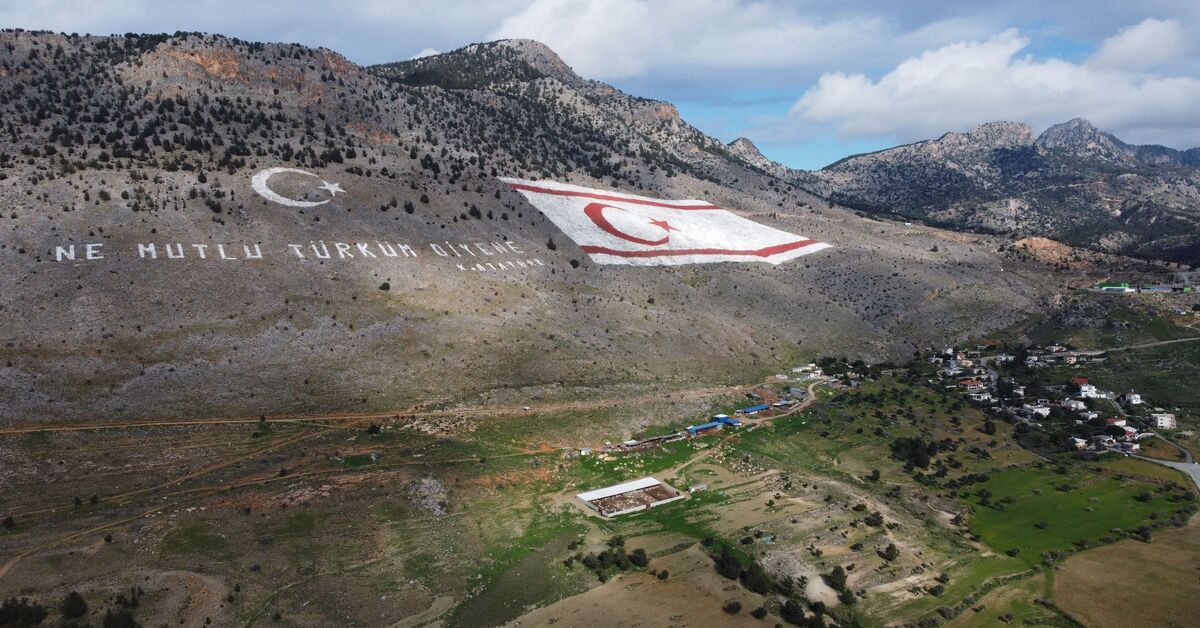North Cyprus anniversary highlights renewed rivalry between Turkey, Greece
ISTANBUL — Fresh fuel has been poured on simmering tensions between fellow NATO members Turkey and Greece following remarks about the future status of the ethnically divided island of Cyprus.
The anniversary of the Turkish Republic of Northern Cyprus (TRNC), which unilaterally declared independence from the internationally recognized Greek-controlled Republic of Cyprus in 1983, saw Mustafa Sentop, speaker of Ankara’s parliament, declare Turkey’s support for a two-state solution on the Mediterranean island.
“Today it has become clear that a solution in Cyprus will only be possible with two equal and sovereign states,” he told an audience in Lefkosa, as the Turkish part of the Cypriot capital, Nicosia, is known, on Monday.
“We will not turn from this path. We will never allow Turkish Cypriots, who are an essential element of the island, to be a minority in their homeland. We will make the whole world accept that the Turkish Cypriot people are as sovereign and equal as Greek Cypriots.”
The island was split following Turkey’s 1974 invasion, which had been prompted by a Greek Cypriot coup aimed at union with Greece. Ankara maintains more than 35,000 troops in the northern third of the island, and the Turkish Cypriot administration is reliant on Turkey, which is the only state to recognize its legitimacy.
Numerous United Nations-mediated efforts at reunification have failed. A 2004 referendum on the creation of a federation of two entities was backed by a majority of Turkish Cypriots but rejected by their Greek counterparts.
For the last two years, Turkish President Recep Tayyip Erdogan has spoken out in favor of a two-state solution. The election of the staunchly pro-Ankara candidate Ersin Tatar in Northern Cyprus’ October 2020 presidential elections was another nail in the coffin for a federal solution.
In the wake of Sentop’s comments, Athens condemned the suggestion of a permanently divided Cyprus as “unacceptable” and one that “undermines all efforts to resume negotiations for resolving the Cyprus issue in the framework of UN resolutions.”
“The unilateral declaration of the pseudo-state in the occupied sections of Cyprus has been irrevocably condemned by the UN Security Council resolutions 541/1983 and 550/1984,” the Greek Foreign Ministry said in a statement.
The decades-old struggle over Cyprus was given further impetus last week when Turkish Foreign Minister Mevlut Cavusoglu announced that Northern Cyprus had been granted observer status at the Organization of Turkic States.
“We will stand with the TRNC everywhere and every time,” Cavusoglu tweeted from the summit in Uzbekistan. He added that Turkey was working “step by step” to secure international recognition for the breakaway territory.
“We have provided our contribution to the solution process by showing that our Cypriot brothers, an indispensable part of the Turkic world, are not alone,” Erdogan told delegates from Central Asia. “I want to thank you for displaying this solidarity.”
The United States and the European Union, which the Republic of Cyprus joined in 2004 as the sole representative authority of the island, both criticized the decision.
“We regret the decision of the Organization of Turkic States to accept as an observer an entity with no international recognition,” a US State Department spokesperson said.
The spokesperson added, “This decision is inconsistent with the principle of territorial integrity and the UN Charter. The United States recognizes the government of the Republic of Cyprus as the only legitimate government of the island.”
European Commission spokesperson Peter Stano described the move as “regrettable,” adding, “The EU has made it repeatedly clear, including at the highest political level, that the EU recognizes only the Republic of Cyprus as a subject of international law, in accordance with the respective UN Security Council Resolutions.”
“Any action to facilitate or assist in any way the international recognition of Turkish Cypriot secessionist entity severely damages efforts to create an environment conducive to resuming settlement talks under the auspices of the United Nations,” Stano said.
Relations between Turkey, Greece and Cyprus have deteriorated over the last two years following a fresh dispute over energy exploration rights in the Eastern Mediterranean Sea in the summer of 2020.
The presence of Turkish ships exploring for gas in waters that Greece and Cyprus claim as their own exclusive economic zone led to a naval standoff. Ankara also asserted its claims that Greece has violated international agreements by militarizing islands off Turkey’s Aegean coast.
Athens embarked on a major military buying spree over the last two years and reiterated accusations of Turkey allowing migrants to cross into Greece despite a 2016 EU deal to halt illegal crossings. Turkey, meanwhile, has documented evidence of Greek migrant “pushbacks” that have led to deaths.
With the rival governments facing elections in June, there are heightened fears that a border incident could spark a wider conflict.
Speaking at the G20 summit in Indonesia on Wednesday, Erdogan repeated his veiled threat to Athens that “we may come suddenly one night.”



